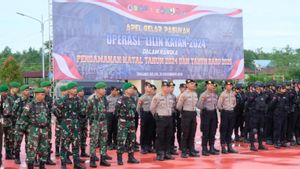JAKARTA - The use of technology is an alternative way to adapt during the corona virus pandemic. To minimize human interaction in preventing the transmission of COVID-19, the National Cyber and Crypto Agency (BSSN) encourages the use of Electronic Signatures (TTE).
According to BSSN, the use of digital TTEs can drive effectiveness and efficiency in various electronic system services. BSSN likens this service to the Pen of 'The New Normal' of Indonesian Bureaucratic Reform.
"Services that are easily accessible with the availability of accurate data are the key to increasing public trust as service users," said Head of the Electronic Certification Center (BSrE) Rinaldy in a press release, as quoted by VOI, Monday, June 8.
BSSN explained, during the Work From Home (WFH) period, the use of BSrE Electronic Certificates for TTE began to be in great demand as a solution to support the implementation of office activities carried out by teleworking by a number of government agencies, BUMN, educational institutions and law enforcement.
At least, based on BSSN data, there are 224 agencies that have entered into a Technical Cooperation Agreement (PKS) with the BSrE method. 55 of them are Central Government Agencies and BUMN, while 169 others are Local Government Agencies, Universities and District Courts.
"The PKS signing is carried out using the Electronic Certificate Service Monitoring Information System (SIMANTAPS) application," wrote BSSN.
Legality of Electronic SignaturesCooperation agreement between BSSN & LKPP regarding the use of electronic certificates in electronic systems at LKPP on Wednesday (13/5) https://t.co/50LD4rdxpn
- STATE CYBER AND PASSWORD AGENCY (@BSSN_RI) May 13, 2020
Electronic signature (TTE) at a glance is different from the scanned signature. Summarized from the Hukumonline page, the use of electronic or digital signatures is an asymmetric cryptography system (asymmetric cryptography) that is made uniquely for each individual.
The implementation of electronic certification or Certification Authority (CA) is regulated in Law Number 11 of 2008 concerning Electronic Information and Transactions (UU ITE) and is specifically regulated in Regulation of the Minister of Communication and Information Technology Number 11 of 2018 concerning the Implementation of Electronic Certification.
"Electronic Signature is a signature consisting of Electronic Information that is attached, associated or related to other Electronic Information that is used as a verification and authentication tool," said the contents of Article 1 number 12 of Law 12/2016 concerning amendments to Law 11/2008 on Law. ITE.
The English, Chinese, Japanese, Arabic, and French versions are automatically generated by the AI. So there may still be inaccuracies in translating, please always see Indonesian as our main language. (system supported by DigitalSiber.id)













